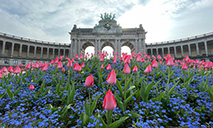Terraced tea garden breathes new life into poor village
HEFEI, April 7 (Xinhua) -- Ascending the stone steps of a terraced tea garden, Fang Dongyu, 68, is busy picking fresh tea leaves with other villagers as the harvest season of spring tea has started.
"We can earn over 10,000 yuan a month (1,572 U.S. dollars) during the harvest season, which was beyond imagination before," said Fang from Wugongling Village of Shexian County, east China's Anhui Province.
Located at an altitude of over 800 meters, the mountainous Wugongling was once a poor village due to the harsh farming conditions and remote location.
In the 1960s, to get rid of poverty and hunger, villagers here spent 13 years creating a terraced tea garden on barren mountains by hand with over 700 million pieces of stones.
"Men and women, old and young, all pitched in on the work. From early morning to late at night, we were working tirelessly with the ambition of bettering our lives," said Fang, who started helping build the tea garden at the age of 13 and witnessed the tea garden gradually grow from the foot of the hill to the top.
Covering an area of over 66.7 hectares, the tea garden was planted with not only tea but also corn and other grains, and greatly relieved starvation and poverty at that time.
Statistics showed that the total grain output of Wugongling hit 8.66 million kg in 1978, which was 4.6 times higher than that in 1968. The tea output and per capita net income doubled respectively during the same period.
Decades have passed and the previous struggling generation has grown old, but the spirit of struggle has been inherited and shows stronger vitality nowadays.
With the promotion of ecological planting, organic tea has been brought to the tea garden. A more profitable white tea base of over 40 hectares has also been developed, attracting young people to return home to start their own businesses.
Growing up with the inspirational story of the tea garden, Lyu Peng, 32, decided to return to the village in 2017. He helped expand his family's tea processing workshop into a factory with two production lines.
"Our tea is of high quality but lacked publicity and marketing channels. I want to use my previous e-commerce experience to sell good tea here all over the country," Lyu said.
E-commerce and short-video platforms including Douyin allow this young man to pursue his dream in this remote place. In 2021, the sales revenue of the tea factory reached more than 500,000 yuan.
There are seven tea factories in the village, and the villagers earned over 8 million yuan by selling freshly picked tea leaves in 2021.
Besides developing the tea industry, the unique natural scenery and history have attracted many tourists to this once isolated village.
"Many people drive here to appreciate the tea garden and the sea of clouds. The room is always full during holidays, and many are regular visitors. Local specialties such as dried bamboo shoots and ham are also popular among the tourists," said Hu Fengyu, owner of a local homestay.
To further develop tourism, the village has built walk paths, observation decks, and a tourist center. In 2021, Wugongling received nearly 50,000 visitors and garnered over 1 million yuan from tourism despite COVID-19.
"We will further develop the village by combining tourism with agriculture, protect our cultural heritage and carry forward the spirit of struggle," said Fang Jincai, Party secretary of Wugongling Village.
Photos
Related Stories
- Villages in China all connected to broadband internet service
- Young man in China's Yunnan decorates village walls with 3D paintings
- Official turns unknown village into popular tourist spot, leads villagers to prosperous lives
- China's 5G network to cover most villages by 2025
- Higher education creates better life for mountain villagers
Copyright © 2022 People's Daily Online. All Rights Reserved.










